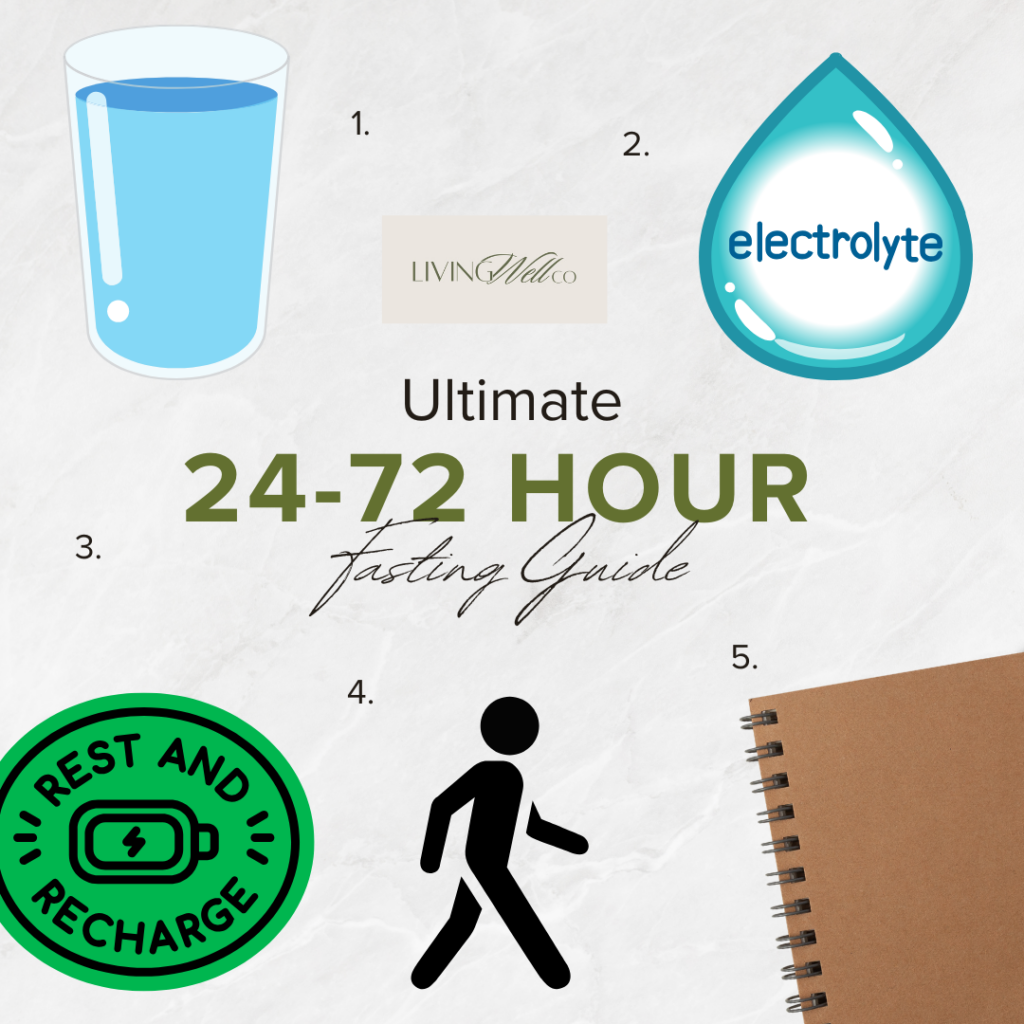For Women.

Important Note: Before starting any fasting regimen, please consult with your healthcare provider, especially if you have any underlying health conditions or are taking medications.
Introduction
Water fasting has gained significant attention in the wellness and longevity communities, and for good reason. As someone who has extensively researched and experienced water fasting, I want to share a comprehensive guide specifically tailored for women interested in this transformative practice. A 24-72 hour water fast can be a powerful reset for your body and mind, but it requires proper understanding and preparation.
The Science Behind Water Fasting
Recent scientific research has revealed numerous benefits of water fasting:
Autophagy
- Research by Nobel Prize winner Yoshinori Ohsumi showed that fasting activates autophagy within 24-48 hours
- A 2019 study in Cell Research demonstrated increased autophagy markers after 48 hours of fasting
- The Journal of Cell Biology (2018) found that women may have enhanced autophagy responses compared to men
Metabolic Benefits
- Research published in Cell Metabolism (2019) showed a 58% improvement in insulin sensitivity after a 3-day fast
- The New England Journal of Medicine’s review (2020) linked fasting to improved metabolic syndrome markers
- A study in Nature Medicine found significant improvements in blood pressure after 72 hours of fasting
Longevity Markers
- Valter Longo’s research at USC showed fasting activates stem cell regeneration
- Studies in aging biomarkers show reduced inflammation markers (IL-6, CRP) after 72-hour fasts
- Research in Cell Stem Cell journal demonstrated enhanced immune system regeneration after 3-day fasts
Benefits Specific to Women
- Hormonal Balance: Fasting can help regulate hormones when done correctly
- Improved Insulin Sensitivity: Particularly beneficial for women with PCOS
- Enhanced Mental Clarity: Many women report improved focus and cognitive function
- Skin Health: Autophagy can contribute to better skin appearance
- Weight Management: Can help break through plateaus and reset eating patterns
Special Considerations for Women
Women’s bodies are more sensitive to extreme dietary changes due to our complex hormonal systems. Here are important factors to consider:
- Timing with Menstrual Cycle
- Best time: During the follicular phase (days 5-14 of your cycle)
- Avoid during: Menstruation and late luteal phase
- Why: Hormonal fluctuations affect fasting tolerance
- Pregnancy and Breastfeeding
2. Pregnancy and Breastfeeding
- Do not fast if pregnant or breastfeeding
- Wait at least 6 months post-pregnancy before considering fasting
- Consult with healthcare providers about timing
Hormonal Considerations
Estrogen and Fasting
- Estrogen levels can affect fasting tolerance
- Best timing: Days 5-12 of menstrual cycle
- Monitoring points:
- Energy levels
- Mood changes
- Sleep quality
- Temperature regulation
Thyroid Function
- Monitor T3, T4 levels if possible
- Short fasts may temporarily lower T3
- Recovery period important
- Supplements to consider:
- Iodine-rich foods post-fast
- Selenium-rich foods
- Zinc support
Strategies during a fast when hunger strikes:
- Meditation
- Light yoga
- Nature walks
- Sleep optimization
- Put phone away in a different room
- No blue light 1 hour before bed
- Take a late afternoon walk to sync your circadian rhythm
- Drink soothing tea
- Dim lights as the sun goes down
- Movement of any kind
- 10 bodyweight squats every 45 minutes
- Stretching
- 2-minute dance
- Relaxation
- Legs up the wall
- Skincare routine
- Bath
- Reading
How to Prepare for Your 24-72 Hour Water Fast
One Week Before
- Gradually reduce portion sizes
- Eliminate processed foods and sugar
- Increase healthy fats and proteins
- Begin intermittent fasting (16/8 method) only 2 days a week and not during your luteal or bleeding phase
- Hydrate well (2-3 liters daily)
Three Days Before
- Reduce caffeine intake
- Plan your fasting dates around your schedule
- Stock up on high-quality water and lemon
- Prepare entertainment and activities
The Fasting Protocol
Day 1
- Morning: Last meal completed by previous evening
- Start with warm water & lemon
- Drink 2-3 liters of water throughout the day
- Add electrolytes, lemon and/or a tbsp of apple cider vinegar if needed
- Expected symptoms: Hunger, slight irritability
- Activity level: Normal to moderate
Day 2
- Often the most challenging day
- Increase water intake to 3 liters
- Continue electrolyte supplementation
- Expected symptoms: Decreased hunger, possible fatigue
- Activity level: Light to moderate
Day 3
- Many report increased energy and mental clarity
- Maintain water and electrolyte intake
- Expected symptoms: Minimal hunger, increased energy
- Activity level: Light
Detailed Meal Plan for Breaking Your Fast
Breaking your fast properly is crucial. Follow this schedule:
Day 1 (Breaking the Fast)
Hour 1-4 (Critical Phase)
- Hour 1: 8 oz homemade bone broth
- Recipe: Simmer grass-fed bones with apple cider vinegar and herbs for 24 hours
- Add 1/4 teaspoon high-quality salt
- Hour 2: Rest and observe how you feel
- Hour 3: 4 oz bone broth with added greens
- Hour 4: Small portion of fermented foods
- 2 tablespoons sauerkraut or kimchi
- 1/4 cup kefir (if dairy-tolerant)
Hours 5-8
- 1/4 ripe avocado
- Steamed leafy greens with olive oil
- Small portion of cooked carrots or squash
Hours 9-24
- Small portions every 3-4 hours
- Focus on easily digestible foods:
- Soft-cooked vegetables
- Small amounts of healthy fats
- Fermented foods
- Bone broth
- Avoid: Raw foods, meat, dairy, nuts
Day 2 Post-Fast
Breakfast
- Soft-boiled egg
- 1/2 avocado
- Steamed spinach
- Bone broth
Lunch
- Light vegetable soup
- Small portion of quinoa (1/4 cup)
- Fermented vegetables
Dinner
- Steamed fish (3 oz)
- Roasted vegetables
- Sweet potato (small)
Day 3 Post-Fast
- Return to normal healthy eating
- Continue to monitor portions
- Maintain whole food focus
Common Challenges and Solutions
1.Hunger Pangs
- Solution: Stay busy, practice meditation, light walking, prayer
2.Electrolyte Imbalance
- Solution: Add high-quality salt to water, consider electrolyte supplements
3.Energy Dips
- Solution: Rest when needed, reduce physical activity
4.Social Pressure
- Solution: Plan your fast during quiet periods, communicate your needs
Long-Term Benefits for Longevity
Research suggests regular fasting can contribute to:
- Reduced risk of age-related diseases
- Improved cellular repair mechanisms
- Better metabolic health
- Enhanced stress resistance
- Potential increase in lifespan
Safety Precautions
Do not attempt a water fast if you:
- Have a history of eating disorders
- Are underweight or malnourished
- Have certain medical conditions
- Are taking specific medications
- Feel unwell or overly stressed
Signs to Break Your Fast Early
- Severe dizziness or weakness
- Heart palpitations
- Severe headaches
- Feeling extremely unwell
- Cold or flu symptoms
- Severe anxiety or distress
Case Studies and Success Stories
Sarah’s Story (Age 35)
“As a busy executive with hormonal imbalances, I was skeptical about fasting. My first 3-day water fast was challenging but transformative. Key benefits:
- Lost 4 pounds (2 stayed off)
- Mental clarity improved dramatically
- PMS symptoms reduced by 60%
- Sleep quality improved
- Skin cleared up within week”
Dr. Maria Rodriguez (Age 42, Endocrinologist)
“I’ve supervised over 100 women through 3-day fasts. Common patterns:
- 80% report improved insulin sensitivity
- 65% experience better sleep
- 70% note reduced inflammation
- 90% report mental clarity improvements”
Jennifer’s Journey (Age 28, PCOS Patient)
“Regular 3-day fasts every quarter helped:
- Regulate menstrual cycle
- Reduce acne
- Improve insulin sensitivity
- Balance hormones naturally”
Additional Scientific References
- Longo, V.D., & Mattson, M.P. (2014). “Fasting: Molecular Mechanisms and Clinical Applications.” Cell Metabolism.
- De Cabo, R., & Mattson, M.P. (2019). “Effects of Intermittent Fasting on Health, Aging, and Disease.” New England Journal of Medicine.
- Wei, M., et al. (2017). “Fasting-Mimicking Diet and Markers/Risk Factors for Aging, Diabetes, Cancer, and Cardiovascular Disease.” Science Translational Medicine.
- Levine, B., & Kroemer, G. (2019). “Biological Functions of Autophagy Genes: A Disease Perspective.” Cell.
- Mattson, M.P., et al. (2018). “Impact of intermittent fasting on health and disease processes.” Ageing Research Reviews.
Conclusion
A 24-72 hour water fast can be a transformative experience when approached mindfully and with proper preparation. As women, our bodies require special consideration and care during fasting. Listen to your body, start slowly, and remember that fasting is a practice that improves with experience.
Remember to approach fasting as part of a broader healthy lifestyle rather than a quick fix. The benefits of water fasting extend far beyond the fasting period itself, potentially contributing to increased longevity and improved overall health.
Your first fast may not be perfect, and that’s okay. Each fasting experience is an opportunity to learn more about your body and its needs. Start with proper preparation, maintain awareness throughout the process, and break your fast mindfully to maximize the benefits of this powerful health practice.
How to Start Your Own Longevity Journey
Everything you need for fasting – we have it for you. With recipes, meal plans, guides on fasting, exercise, hormonal balance – you name it – it is all here.
The Female Longevity Blueprint: Live Well Longer Course
The Female Longevity Blueprint: Live Well Longer Course

Longevity for Women Course: Transform your health and your future
Your one-time purchase, lifetime access to holistic longevity. Includes recipes & meal plans, meditations, exercise guides, hormone balancing tips, and more to help you lose weight, boost energy, and prevent chronic disease.
Longevity from a Woman’s Perspective EBook

If you love to read books – this is for you!!
It is a fun, quick read, to learn more about longevity hacks that will almost instantly start to make you feel better.
Until next time.
Xx,
Alejandra
